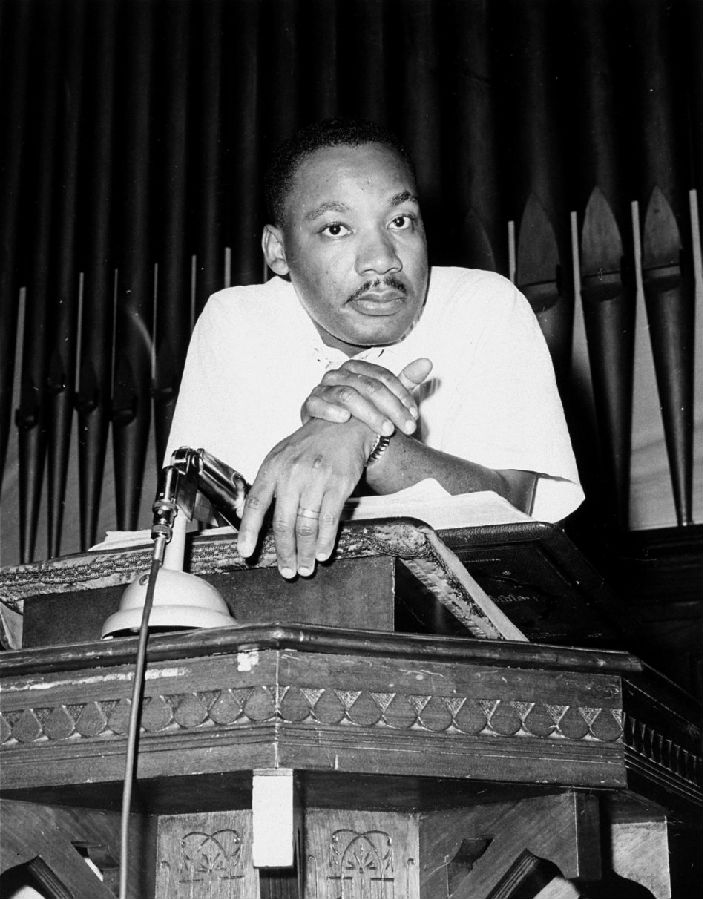The Power of Philanthropy
慈善的力量
by Darren Walker (who is the president of the Ford Foundation)
文/達(dá)倫·沃克(福特基金會(huì)主席)
In the year before the March on Washington,
向華盛頓進(jìn)軍的一年前,
Martin Luther King Jr. prepared a series of sermons that would become the book Strength to Love.
馬丁·路德·金準(zhǔn)備了一系列的布道,那些布道后來(lái)都被收入了《愛的力量》一書。
This was King at his most prodigious and enduring, affirming that we “are caught in an inescapable network of mutuality.”
這是金最驚人也最不朽的時(shí)期,他斷言,我們已經(jīng)“被困在相互依存的網(wǎng)絡(luò)里無(wú)法自拔。”
And, among these 1963 reflections, he challenged the origins and objectives of charity.
在1963年的這些反思中,他對(duì)慈善的起源和目標(biāo)提出了質(zhì)疑。
“Philanthropy is commendable,” he wrote.
“慈善是值得歌頌的,”他寫道。
“But it must not cause the philanthropist to overlook the circumstances of economic injustice which make philanthropy necessary.”
“但慈善家不應(yīng)忽視經(jīng)濟(jì)不公這一問(wèn)題,因?yàn)榻?jīng)濟(jì)不公才有了做慈善的必要。”
King’s words acknowledge a central contradiction:
金的話觸及到了一個(gè)核心矛盾:
philanthropy is a creature of our market system’s unequal benefits,
慈善事業(yè)原本是我們市場(chǎng)體系利益不平等的產(chǎn)物,
and yet charged with addressing its prejudice and exploitation.
其肩負(fù)的任務(wù)卻是消除市場(chǎng)體系利益的這種歧視和剝削。
They also guide us toward a new gospel of giving, defined by new tenets.
他的話也指引我們走向了新的福音——有著完全不一樣的要義的,給予的福音。

Modern philanthropy dates to the Gilded Age, when Andrew Carnegie proposed a radical idea:
現(xiàn)代慈善可以一直追溯到鍍金時(shí)代,當(dāng)時(shí),安德魯·卡內(nèi)基提出了一個(gè)激進(jìn)的想法:
the wealthy should give from their gains to aid “the masses.”
富人應(yīng)該拿出一部分所得來(lái)幫助“群眾”。
Many other families endowed foundations in Carnegie’s mold;
許多其他家庭也按卡內(nèi)基的模式向基金會(huì)慷慨解囊;
the Ford Foundation, which I am privileged to lead, has directed billions of dollars to promote democratic values and human welfare.
我有幸領(lǐng)導(dǎo)的福特基金會(huì)就已撥出數(shù)十億美元用于推進(jìn)民主價(jià)值觀和人類福祉。
Today, “the philanthropist” might more fully understand—as King did—
今天的“慈善家”或許能更充分地理解,像金那樣,
that while many of our efforts are good and even righteous,
盡管我們的很多努力都是好意的,甚至是正義的,
the supply of charitable giving cannot possibly keep pace with the demand for it.
慈善捐贈(zèng)的供給依然根本無(wú)法跟上需求的步伐。
We might recognize that philanthropy is not one thing,
或許,我們會(huì)意識(shí)到,慈善不是一件事,
but rather a continuum that spans from charity on one side to justice on the other—
而是一個(gè)連續(xù)體,一頭是慈善,另一頭則是正義,
and that we must bend economic, social and political systems, the systems that made us, toward the latter.
意識(shí)到我們必須讓經(jīng)濟(jì)、社會(huì)和政治制度,這些造就了我們今天的社會(huì)的制度,朝著后者的方向發(fā)展。
King’s calls of 1963 still reverberate in every village and hamlet.
如今,金1963年發(fā)出的號(hào)召至今仍回蕩在每個(gè)村莊每個(gè)角落。
They must echo in the ways we give, as well.
它們也必須得到我們伸出的援手的呼應(yīng)。
譯文由可可原創(chuàng),僅供學(xué)習(xí)交流使用,未經(jīng)許可請(qǐng)勿轉(zhuǎn)載。











